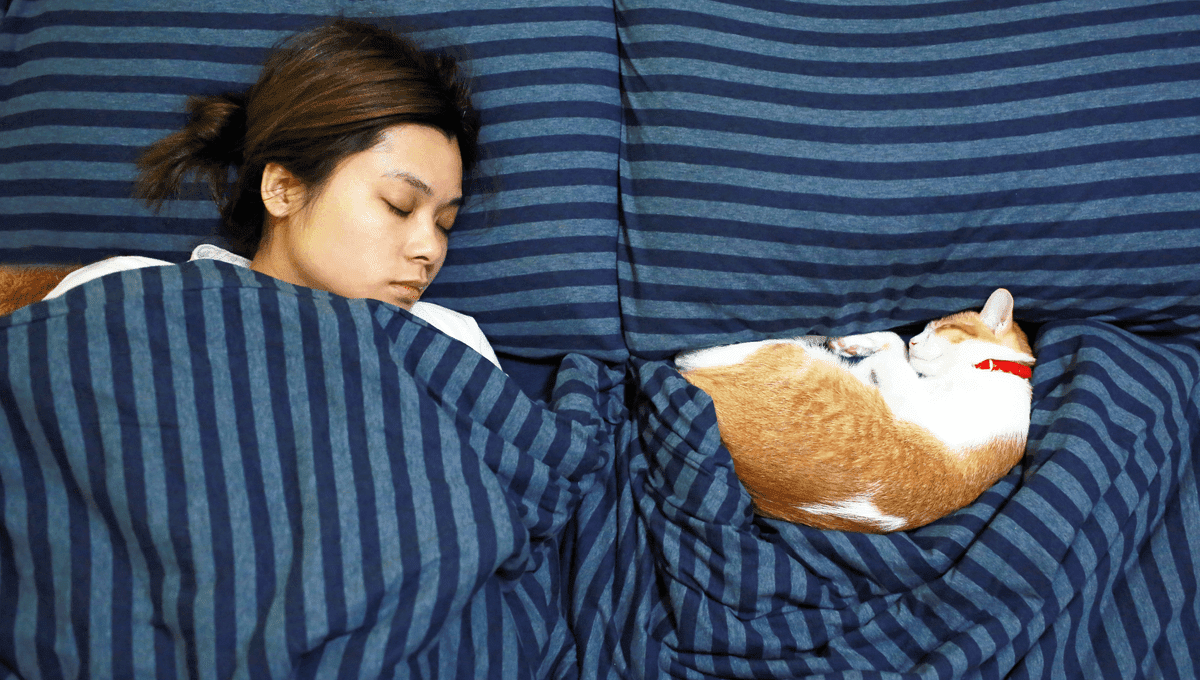
It’s pretty common to hear enthusiastic pet owners referring to their four-legged friends as “fur babies” – a moniker that can sometimes prompt scoffs from people living with the more traditional human type of infant. Sure, you love your doggo or your kitty, worn-out parents might say, but you simply can’t call them your “baby” unless they’re actively eating into your sleep schedule to a potentially dangerous degree.
Well, score one for the pet owners – though it may not be a win they’re happy about. A new review has found that having a pet dog or cat is associated with more restless nights and sleep disorders than living without a furry friend.
“If the causal relationship is established through further investigation, the results will have implications for clinician recommendations for treating patients with poor sleep quality,” said Lauren Wisnieski, Assistant Professor of Public Health and Research and Affiliation at Lincoln Memorial University and lead researcher on the study, in a statement.
“Additionally, educational resources can be developed to inform pet owners about the risks of sleep disruptions and offer potential solutions, such as crating the pet or restricting access to the bedroom at night,” she continued.
But surely this can’t be true? Not when having a pet comes with so many mental and physical health benefits? After all, playing with cats and dogs is great for reducing your stress levels, chilling you out, and generally just making you feel better.
Indeed, previous studies into the effect of pet ownership on sleep quality have come up with conflicting results, Wisnieski explained. “On the one hand, dogs and cats may be beneficial for an owner’s quality of sleep due to the social support that pets provide,” she said. “Pets offer a sense of security and companionship, which may result in improvements in levels of anxiety, stress and depression.”
“Yet on the other hand, pets may disrupt their owners’ sleep,” she added – and it seems the research agrees. Using data from the US National Health and Nutrition Examination Survey (NHANES), conducted in 2005-2006, Wisnieski and her team built multivariable logistic regression models that measured a selection of important sleep quality factors.
The study “aimed to determine if there is an association between dog and cat ownership and sleep quality and sleep disorders,” Wisnieski noted, “including consideration of aspects such as snoring, waking up during the night, needing pills to sleep and leg jerks.”
The results? As adorable as your pupper or kittycat may be, they might not be the best housemate if you’re after a good night’s sleep. Having a dog, the data revealed, was associated with a greater chance of having a sleep disorder and having trouble sleeping; having a cat, on the other hand, was associated with a higher chance of experiencing leg jerks during sleep.
As for why this association exists – well, it’s still an open question. With the limited NHANES data, it’s not possible to gather data on pet ownership more detailed than “do you have a pet?” – no information on whether said critters are sharing a bed, free to roam, or confined to a room through the night.
“In the future, studies would benefit from measuring the human-animal bond,” Wisnieski said, “so that we can understand how the strength of it affects quality of sleep.”
Until further research is carried out, the exact cause of the relationship will remain a mystery. Though that’s not to say Wisnieski has no ideas: as far as cats go, she suggested, it simply may be because the little fuzzballs tend to be more active at night.
Which definitely makes sense, right? After all, as any cat owner will tell you, those 3 am zoomies and intermittent wrestling matches don’t exactly make for a soothing lullaby.
The paper is published in the journal Human-Animal Interactions.
Source Link: Having A Pet Cat Or Dog Might Be Ruining The Quality Of Your Sleep